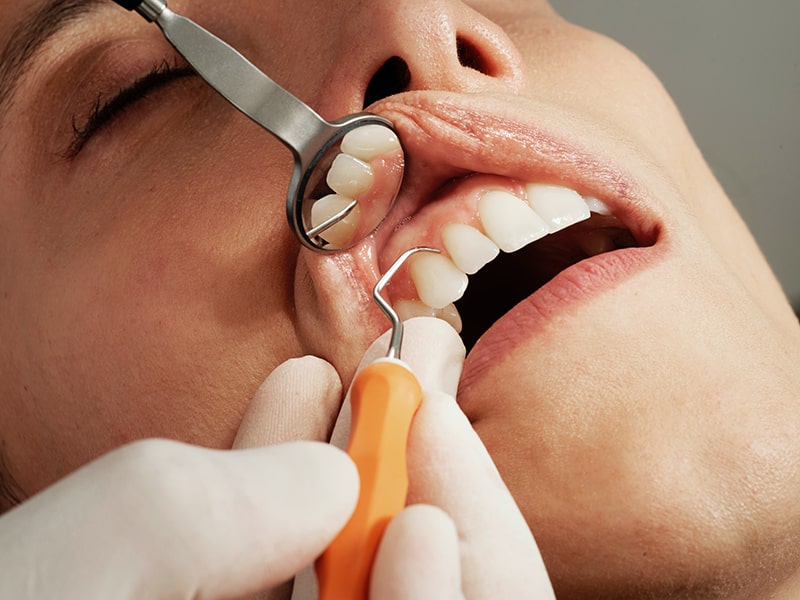Periodontics

Periodontics is the field of dentistry focusing on the health of the supporting structures of teeth and treating conditions that affect them, such as gum disease.
Periodontal diseases are infections of the structures around the teeth, which include the gums, periodontal ligament, and alveolar bone. In the earliest stage of gum disease, gingivitis, the infection affects the gums but it can be treated. However, if left untreated, a serious gum infection could damage the soft tissue and could destroy the bone that supports your teeth causing teeth to loosen or lead to tooth loss.
The periodontal clinic covers the processes of prevention and treatment of diseases in the periodontal area. Many patients suffer from periodontal disease and are not even aware of it until the onset of alarming symptoms. The problem is that often with periodontal problems, the patient does not have any pain, and they turn to the doctor only when the disease goes into a serious stage and there is a risk of losing a tooth. Accurate diagnosis and well-conducted treatment is the key to success and maintaining teeth in their places.
When to See a Doctor?
The vast majority of diseases can be diagnosed and successfully treated before they become serious. To do this, it is enough to pay attention to the condition of the oral cavity and visit a specialist in time. Just by examining your teeth and gums in the mirror, you can assess their condition. You should contact your doctor immediately if you notice the following changes:
- Blood appears when the gums are stressed – when brushing your teeth, or biting off hard fruits
- Appearance of tartar
- Exposing the necks of the teeth as a result of receding gums
- Bad breath
- Soreness of soft tissues, the appearance of swelling on the gums
- Tooth mobility
What Diseases Do Periodontists Treat?
- Gingivitis: this is an inflammation of the tissues in contact with the teeth. This is the most common disease. It is associated with poor oral hygiene. If not removed in time, plaque becomes hard, that is, it turns into a stone. This is not only a hotbed of bacterial development but also a zone where plaque will accumulate even more actively. Waste products of microbes irritate tissues, causing swelling, odour, and inflammation. With proper care and professional treatment, gingivitis is eliminated quite simply and irrevocably.
- Periodontitis: the disease affects the periodontal tissues and requires prompt periodontal treatment by a specialist. A distinctive feature of the pathology is the appearance of pockets. This is a consequence of advanced gingivitis, which was not treated correctly. Also, pockets can occur as a result of malocclusion and errors in prosthetics. There is no question of the disease going away on its own. An integrated approach is needed, otherwise, the teeth will loosen, and it will not be possible to save them in the later stages.
- Parodontosis: damage to the mucous membrane that holds the teeth, which has passed into the chronic stage. The main danger is the asymptomatic course of the disease until serious problems and the threat of tooth loss appear. Dystrophic tissue changes occur, the vascular system is disrupted, and the gums become pale, sluggish and droop, exposing the necks of the teeth.
Parodontological Diseases Treatment Methods
The choice of treatment method depends on the clinical picture. At the initial stages of the development of the disease, they are treated quickly and quite simply, which allows you to save your teeth and do without serious intervention. They include:
- Professional cleaning of plaque and tartar
- Restoring proper oral hygiene
- Anti-inflammatory agents of general and local action
In serious cases, when the disease enters an advanced stage, complex measures are applied, including methods of surgical periodontology. Typically, treatment includes:
- Removal of dental deposits
- Cleaning pockets, and sanitation of the oral cavity
- Antiseptic treatment
- Splinting if necessary (fixing mobile teeth)
- Surgery to restore bone tissue
- If the teeth cannot be saved, prosthetics are used
Periodontist
Dr Samy Darwish
Oral Maxillofacial Surgeon and Periodontist

A periodontist is a dentist that specialises in the prevention, diagnosis, and treatment of periodontal disease and in the placement of dental implants.
Dr Samy Darwish , Oral & Maxillofacial Surgeon & Periodontics Specialist.
Languages – Arabic & English
A member of the Royal College of Surgeons, UK, Master of Science MSc with research into dental implants, postgraduate MClinDent in Periodontology and Masters in Restorative Dentist of the Royal College of Surgeons.
His specialty:
- Surgical root canal treatments
- Removal & treatment of impacted teeth
- Gum diseases treatment & gum recession
- Dental implants
- Facial pain including jaw joint problems
- Lumps, bumps, and ulcers in the mouth
- Biopsies of the mouth
- Oral cancer detection
